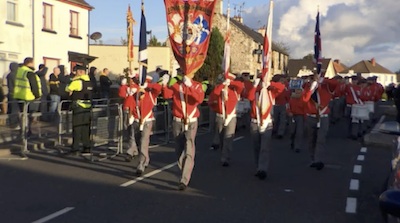
A loyalist parade in a County Antrim village on Friday night breached Parades Commission determinations on numerous occasions, but passed off without violence.
Hundreds of loyalists took part in the annual ‘Ballymaconnelly Sons of Conquerors’ Flute Band march in Rasharkin. A heavy policing operation surrounded the annual parade which dramatically escalates the levels of sectarian tension in the town.
Two nationalist groups, Rasharkin Residents’ Collective and Rasharkin Residents’ Association, were given permission to hold small protests. The loyalist bands were restricted to a drumbeat through part of the village’s main street.
Sean Hanna, spokesman for Rasharkin Residents’ Collective, said some demonstrators were spat at during the march. Picket fencing at some properties being torn down and masonry ripped from pillars.
However, he said the situation had improved compared to previous years. “The fact that there was no music kept the whole thing a lot calmer,” he said.
Local Stormont Assembly member Daithi McKay said loyalist paramilitary flags had been flown during the parade, and pointed out that one of the bands taking part was named after UVF assassin Geoffrey Freeman.
“Dialogue is the only way to solve difficulties around contentious parades. The Haass proposals on dealing the parades, flags and the past offered a way forward and I am calling on unionists to implement those proposals and to return to talks on parades.”
Meanwhile, three loyalist groups have been given permission to hold protests during a republican commemorative parade in north Belfast which sparked serious violence two years ago.
Up to 500 people and seven bands are expected to take part in the march organised by the Henry Joy Commemoration Committee, which is aligned to the Republican Network for Unity.
The event has been organised for Sunday, August 31st, to commemorate United Irishman Henry Joy McCracken, a Protestant republican who was executed by British forces in 1798 and buried at Clifton Street Cemetery.
Loyalists rioted for several nights in 2012 after it passed near Clifton Street Orange Hall, which is located near an interface with the predominately nationalist Carrick Hill district. Last year organisers abandoned the parade after the Parades Commission banned them from passing through the area.
RNU spokesman Stephen McCourt said the group was satisfied with the determination.
“The central theme of the event has always been anti-sectarianism and a celebration of secular Belfast radicalism,” he said.
CHURCHES ATTACKED
However, sectarian tensions have continued in south Antrim, where two Catholic churches have been damaged. Graffiti was daubed on St Peter’s Church in Stoneyford and on St Joseph’s Church in Glenavy in the early hours of Saturday.
Parishioners cleaned up the paint damage yesterday prior to Sunday Mass.
On Friday, a British war memorial in Stoneyford also had paint thrown over it.
Sinn Fein Glenavy councillor Mary Kate Quinn said attacks on all places of worship or community facilities are wrong.
“There is no place in Glenavy or Stoneyford for this sectarian bile and I am sure the community will rally around the local priests in order to have the churches restored to their former state,” she said.
![[Irish Republican News]](https://republican-news.org/graphics/title_gifs/rn.gif)
![[Irish Republican News]](https://republican-news.org/graphics/title_gifs/harp.gif)

